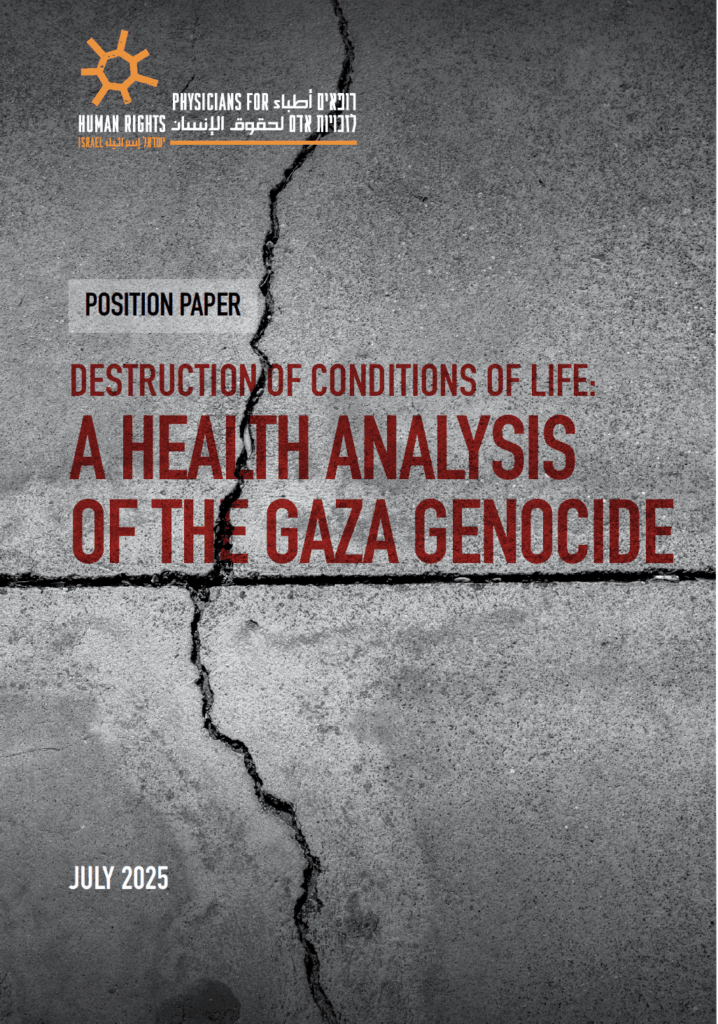A destruction of the conditions of life: Report on Genocide in Gaza
Fiona Campbell
Israel’s military campaign is deliberately and systematically dismantling Gaza’s health and life-sustaining systems, says Physicians for Human Rights Israel, in a position paper released this week. PHRI’s health-centered legal analysis examines Israel’s conduct in Gaza over the last 22 months, following Hamas’ attack on Israel in October 2023, presenting a chronology of Israeli actions in Gaza that have “destroyed Gaza’s healthcare infrastructure in a manner that is both calculated and systematic”, and detailing its determination that these acts constitute genocide under international humanitarian law.

The paper presents evidence to demonstrate Israel’s deliberate policy of targeting and eliminating Palestinians as a group, and concludes that Israel is committing, at a minimum, three acts enumerated by Article II of the Genocide Convention. These are: a) killing members of the group, b) causing serious bodily or mental harm to members of the group, and c) deliberately inflicting on the group conditions of life calculated to bring about its destruction.
Taking a health-focused approach to identify genocidal intent and policy, the report documents the systematic dismantling of Gaza’s health system, destruction of medical facilities, blocking of drugs, and killings and arrests of health workers. “With each assault, more hospitals collapsed, staff were killed or detained, and essential services could not be provided,” says PHRI of the last 22 months. “Systemic failure became self-reinforcing; displacement led to overcrowding, overcrowding accelerated disease, and disease spread unchecked amid collapsing sanitation.”
Primarily focusing on Article II(c), the report emphasizes Israel’s destruction of Gaza’s “foundational structures of survival” through exploring nine thematic sections, including (among others), obstruction of medical evacuations, erosion of social determinants of health, and the collapse of long-term critical care. Evidence is also presented on the role of starvation and rampant malnutrition in Gaza, ever-increasing throughout 2025. The paper cites the calls of UN agencies that starvation continues to be imposed as a tool of war against Palestinians in Gaza and covers the weaponization of aid through its deliberate restriction and total shutdowns, which has left those living in Gaza in increasingly desperate situations.
Another thematic section traces Israel’s widespread environmental destruction of Gaza, noting that 93% of households faced water insecurity as of June 2025, croplands have been razed, 80% of trees are destroyed, and 95% of livestock have been killed. Alongside aid blockades and the broader weaponization of starvation, this environmental demolition has left over one million people (nearly half the population) facing emergency levels of food insecurity, and 470,000 facing catastrophic levels. The report states this “direct, cumulative, and foreseeable pattern of destruction renders Gaza incapable of supporting human life. The facts reflect not the incidental consequences of war, but a policy of extermination pursued through the systematic collapse of health, water, food, and shelter… calculated to bring about the physical destruction of the group…”
The paper also examines Israel’s breaches of the Genocide Convention under II(a) and II(b). These sections demonstrate a disregard for key principals of international humanitarian law, such as proportional military response, the use of aid as ‘bait’, and the physical and psychological harms inflicted by Israeli forces and policies. Emphasizing the extent of suffering perpetrated in Gaza, the report details the widespread maiming of Palestinians, noting that as of July 2025, more than 140,000 Palestinians have been injured, a minimum of 4,700 have undergone amputations, and at least 4,300 require prosthetics or mobility aids according to the Gaza Ministry of Health. “Over 18,500 wounded people are currently in need of rehabilitation services,” most of whom have no access to necessary medical care.
PHRI concludes that an analysis of available evidence and applicable legal standards shows “Israel is committing acts under Article II(a), (b), and (c) of the Genocide Convention, including killing, inflicting serious bodily and mental harm, and deliberately imposing conditions of life intended to destroy the Palestinian population in Gaza, in whole or in part” and that “there is sufficient evidence to establish that these acts are carried out with the specific intent required by Article II.”
The organization condemns Israel’s failure to comply with its obligations under international law and specifically its breach of the Genocide Convention. They urge relevant international bodies to “initiate proceedings and investigations as mandated by international law”, and call for global solidarity and mobilization, especially among health professionals and humanitarian actors. Acknowledging that prevention of genocide at this point “may no longer be a possibility”, they implore health and humanitarian communities worldwide to confront the destruction of Gaza’s medical system, attacks on its infrastructure and environment, and deliberate targeting of the conditions needed for human survival in Gaza. Already “the sum of Israel’s conduct has dismantled existing conditions of life with effects into the future,” and third parties, PHRI argues, have a duty to terminate this genocidal campaign and protect the health, lives, and dignity of Palestinians.
Fiona Campbell, LLM Human Rights, is Editorial Assistant at Health and Human Rights

